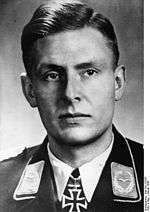Major (Germany)
Major (German pronunciation: [maˈjoːɐ]) is the lowest staff officer rank in the German Army (Heer), German Air Force (Luftwaffe). The rank is rated OF-3 in NATO. The rank insignia is a silver oakleaf cluster with a silver pip (star).
- For the use of this rank in other countries, see major.
| Major | |
|---|---|
  Army and Air Force insignia | |
| Country | |
| Service branch | |
| Abbreviation | Maj |
| NATO rank | OF-3 |
| Non-NATO rank | O-4 |
| Formation | 1956 |
| Next higher rank | Oberstleutnant |
| Next lower rank | Hauptmann |
| Equivalent ranks |
|
The OF-3 equivalent of the German Navy (Marine) is the Korvettenkapitän.
To be appointed to the rank of Major, the officer has to pass a staff officer basic course (Stabsoffizierlehrgang) which is held at the German Armed Forces Command and Staff College (Führungsakademie der Bundeswehr), and serve in a post coded A13 or A13/A14.
In the German Army and the Joint Support Service (Streitkräftebasis), the waiting period between meeting the requirements for promotion and actual promotion to the rank of Major averages 15 months due to budget problems (as of July 2010).
Rank insignia
On the shoulder straps (Heer, Luftwaffe) there is one silver pip (star) in silver oak leaves.
German Heer/Luftwaffe officer rank | |||
| Line officer career | |||
| junior Rank Hauptmann |
Major (Oberstabsarzt) Kovettenkapitän |
senior Rank Oberstleutnant | |
| Warrant officer / officer specialist career | |||
| Hauptmann | Stabshauptmann | End of officer specialist career | |
History

The Major rank in German speaking armed forces dates back to the Middle Ages. It equates to major in the British and US Armies, and is rated OF-3 in NATO.
During World War II, the SS equivalent was Sturmbannführer.
See also
- Ranks of the German Bundeswehr
- Rank insignia of the German Bundeswehr
- Comparative military ranks of World War I
- Comparative military ranks of World War II